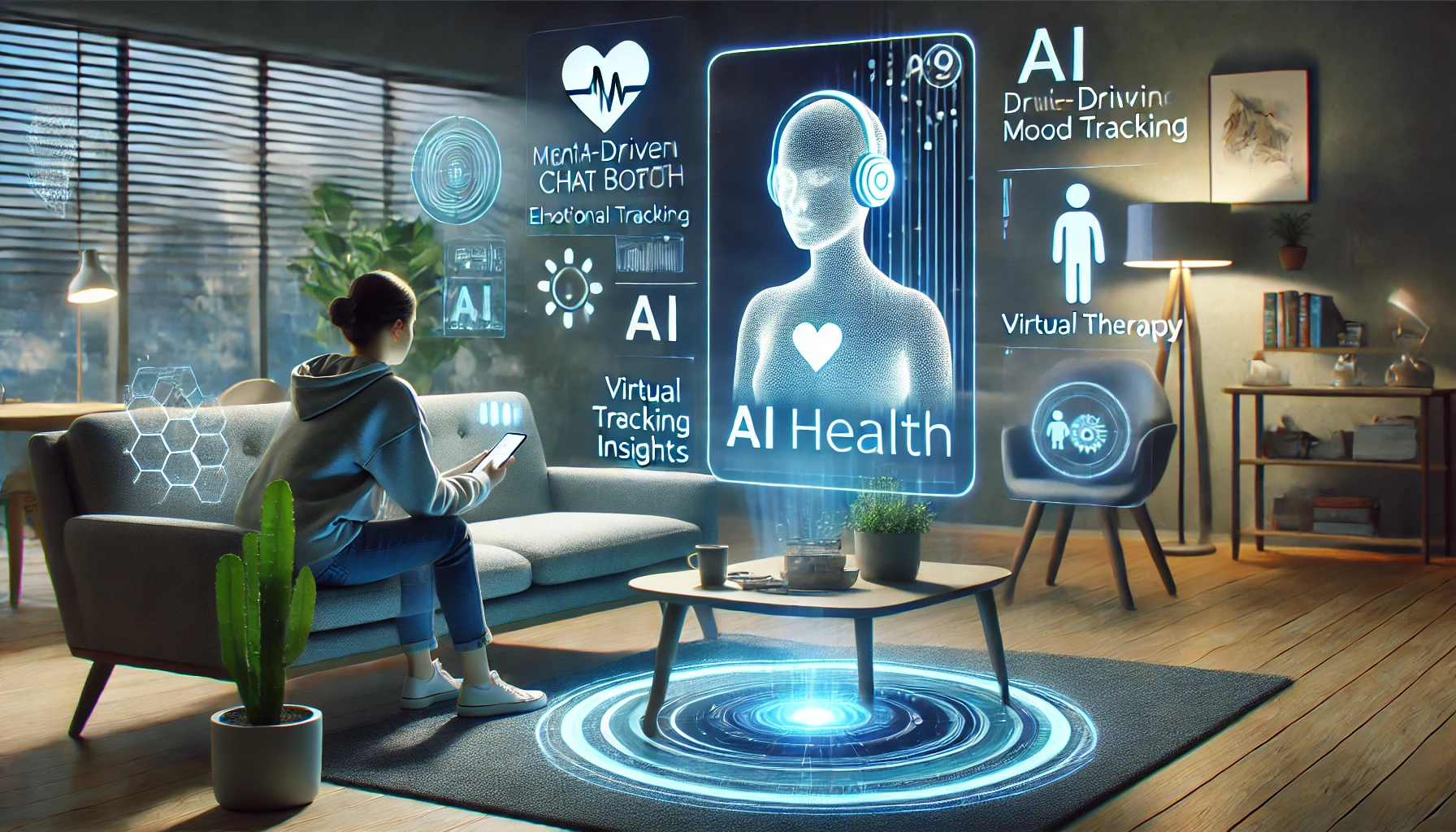Artificial Intelligence (AI) is transforming mental health care by providing virtual therapy, mood tracking, and AI-powered emotional support chatbots. These technologies make mental health services more accessible and affordable. In this article, we will explore how AI is enhancing mental health support.

Image: Individual accessing digital mental health support on a mobile device. Photo by Shvets Production from Pexels, licensed under Pexels License.
1. The Role of AI in Mental Health Care
AI improves emotional well-being by:
Providing AI-powered chatbots for emotional support, offering 24/7 assistance for those dealing with anxiety, stress, and other mental health challenges.
Tracking mood and stress levels through AI-driven analysis of voice patterns, text messages, and behavioral data to detect changes in mental state.
Enhancing therapy accessibility with virtual counseling, breaking down barriers of cost, location, and stigma that prevent many from seeking help.
Global Impact: According to the World Health Organization’s 2024 Digital Mental Health Initiative, AI-powered mental health tools have expanded access to support services for over 300 million people who previously had no access to mental health resources.
2. Best AI Tools for Mental Health Support
A. AI Chatbots for Emotional Support
Woebot AI: Uses cognitive behavioral therapy (CBT) techniques for mental wellness, helping users identify negative thought patterns and develop healthier responses to stress and anxiety.
Wysa AI: AI chatbot designed to help manage stress and anxiety through evidence-based techniques including CBT, dialectical behavior therapy (DBT), and mindfulness practices.

Image: User engaging with an AI-powered mental health chatbot. Photo by Karolina Grabowska from Pexels, licensed under Pexels License.
B. AI-Powered Mood Tracking and Therapy
Youper AI: AI-driven tool for tracking emotions and mental health that creates personalized insights based on mood patterns and suggests targeted interventions.
Mindstrong AI: Uses AI to detect early signs of depression and anxiety by analyzing smartphone interaction patterns, such as typing speed and app usage, to identify behavioral changes that may indicate mental health challenges.
C. AI in Virtual Counseling and Therapy
Talkspace AI: Connects users with licensed therapists through AI-assisted recommendations, using algorithms to match clients with professionals based on their specific needs, preferences, and therapy goals.
BetterHelp AI: Uses AI to match patients with the right mental health professionals from a network of thousands of therapists, considering factors like specialization, approach, and communication style.
“AI doesn’t replace human therapists—it extends their reach. These technologies allow mental health professionals to support more people while focusing their time on patients who need intensive, face-to-face care.” — Dr. Tom Insel, former Director of the National Institute of Mental Health
3. AI and Personalized Mental Health Care
AI-powered meditation apps provide guided relaxation exercises that adapt to user feedback and progress. Applications like Headspace and Calm now incorporate AI to create personalized meditation experiences based on user preferences, stress levels, and meditation history.
AI-driven sleep tracking tools improve emotional well-being by monitoring sleep patterns and offering personalized recommendations to improve sleep quality. Since poor sleep is strongly linked to mental health issues, these tools can have significant impacts on overall psychological wellness.

Image: AI-driven sleep and meditation tracking applications improving mental wellness. Photo by Cottonbro from Pexels, licensed under Pexels License.
AI-enhanced self-help programs tailor therapy exercises to individual needs, creating customized cognitive behavioral therapy routines based on user data and progress. These programs can adjust difficulty levels and focus areas based on user engagement and reported outcomes.
Case Study: A 2024 clinical trial of 5,000 participants using AI-powered CBT apps showed a 42% reduction in moderate anxiety symptoms over three months, comparable to results from traditional therapy but at less than one-tenth the cost.
4. The Future of AI in Mental Health
The mental health field is poised for even more revolutionary AI implementations:
AI-powered virtual therapists for real-time emotional support that can understand and respond to complex emotional cues. These systems are being developed to recognize subtle changes in facial expressions, voice tone, and language use to provide more human-like interactions.
AI-driven early detection systems to prevent mental health crises by identifying warning signs before acute episodes occur. These predictive systems analyze patterns in behavior, communication, and physiological data to alert care providers when intervention may be needed.

Image: Next-generation AI mental health support systems demonstrating emotional intelligence. Photo by Shvets Production from Pexels, licensed under Pexels License.
AI-enhanced personalized mental health treatment plans that continuously adapt therapy approaches based on patient responses and outcomes. These systems learn which techniques work best for specific individuals and adjust recommendations accordingly.
“The next frontier in mental health care isn’t just about making therapy more accessible—it’s about making it more effective through personalization. AI gives us the tools to tailor mental health interventions to each person’s unique needs, challenges, and preferences.” — Dr. Alison Darcy, Clinical Psychologist and Digital Health Innovator
Balancing Technology and Human Connection
While AI offers tremendous benefits for mental health care, important considerations remain:
Privacy and data security: Mental health data is highly sensitive, raising questions about how information is stored, protected, and used.
The therapeutic relationship: Many aspects of human connection in therapy cannot be replicated by AI, suggesting that hybrid approaches combining technology with human care may be most effective.
Digital equity: Ensuring that AI mental health tools reach those who need them most, including underserved communities with limited technology access.
Conclusion: A New Era of Mental Health Support
AI is making mental health care more accessible, affordable, and effective. Whether through chatbots, virtual therapy, or mood tracking, AI-powered tools are providing essential emotional support to millions who might otherwise go without help. These technologies are not replacing human therapists but extending their reach and effectiveness.
As AI continues to evolve, we can expect mental health support to become increasingly personalized, proactive, and integrated into our daily lives. The future of mental health care likely involves thoughtful combination of human expertise with AI capabilities, creating a system that is more responsive to individual needs and accessible to people everywhere.
While we navigate important questions about privacy, ethics, and the human element of therapy, the potential of AI to democratize mental health support and reduce suffering globally is too significant to ignore.
Explore AI-driven mental health solutions today for a healthier mind!
Have you tried any AI-powered mental health tools? What was your experience like? Share your thoughts in the comments below.

